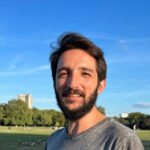An alternative education: The Free University London experience
Date 23 October 2023
In 2019-2020, Onur was involved in Free University London (FUL), a higher education (HE) initiative that provides free university-level modules to anyone interested. The project has been a rich source of inspiration and pride for Onur. In his research and teaching practice, Onur continues to explore paths to social change at a larger scale.

In 2019-2020, I was involved in Free University London (FUL), a higher education (HE) initiative that provides free university-level modules to anyone interested.
Though it may seem simple, it was a daunting task when we did not have any funds or institutional backing. I and three colleagues, as the co-founders, considered ways to organise and promote our modules from the ground up. There were deliberations on every aspect of what is normally provided in universities by dedicated – and paid – units, ranging from logo and website design to student outreach, to arranging for a venue and tutor recruitment.
Our article, ‘An alternative experience in the depths of neoliberal education: Free University London’, co-authored with Malcolm Macqueen, provides an overview of this experience, detailing our achievements as well as some of the issues we faced. At the time of writing, we had provided modules on topics covering approaches to education, socialisms in practice, and the history and philosophy of mathematics, with several more on the way. We received an impressive amount of support from colleagues at various institutions who volunteered to lead modules on their topics of expertise. Our first venue was a community centre in south London, which was a cooperatively owned and managed space founded on a social vision of solidarity and equality. As such, we were part of a larger ‘ecology’ of autonomous and horizontally organised movements that circumvented state and market institutions and directly engaged in voluntary cooperation and mutual aid.
In the article, we discuss some of the practical implications of building independent, egalitarian spaces with minimal resources, and hope to foster a debate among like-minded attempts to oppose the commodification of education and serve as a reference point for efforts in this direction. Beyond the practical focus, we elaborate on importance of efforts to counteract the pervasive subordination of our social and working lives to market logics. Our contention is that, even as much more of a worksite for social change than finished product, initiatives such as FUL show that we can reclaim the foundational values of HE from the dictates of marketisation. We already possess the capacity and knowledge to put together an educational institution and provide resources to people of all walks of life, regardless of ability to pay. As an ongoing initiative, the sheer existence of FUL could demonstrate that, at the risk of sounding clichéd, we are the ones that we have been waiting for. We do not need to wait for change at the government or policy level to take stock of our diverse abilities and resources available to us. We can build the institution that embodies the rationales that led many of us to take the academic path in the first place.
In my experience as a tutor, I gained an awareness of the consequences of the student-as-consumer model of academia from a new perspective. Having worked in formal institutions, I was unaware of the possibilities that a ‘do-it-yourself’ approach could create. This helped me to realise that putting a different vision of education to use could begin to prefigure what an alternative education could look like. In sum, we were engaged in the construction of what has been called a ‘concrete utopia’ – a notion of utopia that embraces complexity and fallibility, and strives for a process-oriented unfolding rather than ‘perfection’. The education we provided was not directly tied to the needs of the market, and thereby created a space to experience, and experiment with, the pursuit of knowledge as an end in itself. Rather than an instrumental means to an end, education can be a collectively attained, lifelong, and inherently unfinished process. In our sessions, students could practice critical thinking without the urge to reach for easy answers.
This process signalled a turn away from what the radical pedagogical scholar Paolo Freire (1968) had called the ‘banking model’ of education, where information is ‘deposited’ into the student as the empty vessel, to be ‘withdrawn’ later on. Instead, FUL came to be a horizontally-organised initiative that drew its participants into collective debates on the fundamental questions of social and political life. Students were invited to voice their viewpoints and concerns on all dimensions of module design and delivery. Through such efforts, elaborated further in the paper, FUL began to dispense with the hierarchies associated with conventional university education.
Though I am no longer an organiser, the FUL project has been a rich source of inspiration and pride for me. In my research and teaching practice, I continue to explore paths to social change at a larger scale. As a social theorist, I am interested in how social and political transformations unfold and scrutinise the roles of social movements and political parties in such processes. Consequently, I have been working on a journal article which considers radical local governments in Turkey. The examples evince processes of empowerment, comparable to that sought by FUL, over the means of social reproduction. In this project, I wish to tease out the features of these local governments that present novel ways of organising social life and deepening democratic oversight. Education and re-education once again play an important role, as communities are subjectivised as participants in a reach for a society beyond the limits of the status quo. I lead the module SOC3063 – Sociology of the Future, which incorporates a large body of literature on utopianism, and draws attention to the multiple ways in which a utopian orientation exists throughout human societies, as well as in modest ‘experiments’ like FUL. Moreover, this experience directly informs the design of the prospective social and cultural transformations module currently in preparation for future iterations of the sociology programme.
Having examined utopian experiments with all the dilemmas, hindrances, frustrations involved, I believe that re-imagining and practicing education as a lifestyle, vital need, and therefore an inalienable right for all members of society may bring up more issues and questions that it resolves, and so it should be.
Another education is possible.
